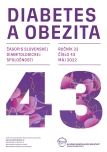-
Medical journals
- Career
Co-formulation of insulin degludec and insulin aspartate in realworld clinical practice: the ARISE study
Authors: Zbynek Schroner 1,2
Authors‘ workplace: Lekárska fakulta UPJŠ v Košiciach 1; SchronerMED, s. r o., Košice 2
Published in: Diab Obez 2022; 22(43): 39-43
Category: Clinical studies
Overview
1st Oct 2021 came to clinical practice in Slovak republic new co-formulation of insulin degludec and insulin aspart (IDegAsp). Clinical trial program with IDegAsp has the name BOOST. IDegAsp among all the trials proved good glycemic control, lower insulin dose and risk of hypoglycemia. Some studies from real clinical practice were done with IDegAsp. ARISE was a 26-week, multicenter, prospective, non-interventional study from a real clinical practice. The aim of the study was to investigate changes in relevant clinical parameters, such as glycemic control and rate of hypoglycemia in patients who initiated or switched insulin regime to treatment with IDegAsp. The primary endpoint was change in HbA1c from baseline to end of study. Across all prior therapy subgroups, treatment with IDegAsp was associated with significant improvement in HbA1c. Significant reductions of FPG, weight, rate of hypoglycemia and total and basal dose of insulin were also observed.
Keywords:
ARISE – studies from real clinical practice – study IdegAsp
Sources
1. Hirsh LB, Franek E, Mersebah H. Safety and efficacy of insulin degludec/insulin aspart with bolus mealtime insulin aspart compared with standard basal–bolus treatment in people with Type 1 diabetes: 1–year results from a randomized clinical trial (BOOST® T1). Diabet Med 2017; 34(2): 167–173. Dostupné z DOI: <http://dx.doi.org/10.1111/dme.13068>.
2. Fulcher GR, Christiansen JS, Bantwal G et al. BOOST: Intensify Premix I Investigators. Comparison of insulin degludec/insulin aspart and biphasic insulin aspart 30 in uncontrolled, insulin-treated type 2 diabetes: a phase 3a, randomized, treat-to-target trial. Diabetes Care 2014; 37(8): 2084–2090. Dostupné z DOI: <http://dx.doi.org/10.2337/dc13–2908>.
3. Kaneko S, Chow F, Choi DS et al. Insulin degludec/insulin aspart versus biphasic insulin aspart 30 in Asian patients with type 2 diabetes inadequately controlled on basal or pre-/self-mixed insulin: a 26-week, randomised, treat-to-target trial. Diabetes Res Clin Pract 2015; 107(1): 139–147. Dostupné z DOI: <http://dx.doi.org/10.1016/j.diabres.2014.09.026>.
4. Haluzík M, Fulcher G, Fieber TR et al. The co-formulation of insulin degludec and insulin aspart lowers fasting plasma glucose and rates of confirmed and nocturnal hypoglycaemia, independent of baseline glycated haemoglobin levels, disease duration or body mass index: A pooled meta-analysis of phase III studies in patients with type 2 diabetes. Diabetes Obes Metab 2018; 20(7): 1585–1592. Dostupné z DOI:<http://dx.doi.org/10.1111/dom.13261>.
5. Fulcher GR, Al-Jaser AJ, Medina J et al. IDegAsp treatment in adults with type 2 diabetes in real-world practice: clinical outcomes by prior therapy subgroup. Abstract and oral presentation at Australasian Diabetes Congress, August 13, 2021.
Labels
Diabetology Obesitology
Article was published inDiabetes and obesity

2022 Issue 43-
All articles in this issue
- Editoriál
- Relationship of glycemic variability and diabetes risk factors in pregnant women
- From the adult type through NIDDM and second type of diabetes – what is coming thereafter?
- Cardiovascular effect of GLP-1 receptor agonists: meta-analyses suggest a class effect
- Use of SGLT2 inhibitors in type 2 diabetics at different stages of the cardiovascular continuum
- Cardiorenal benefits of GLP-1 receptor agonists in the treatment of type 2 diabetes mellitus
- Treatment with biosimilar insulin in routine clinical practice in Slovakia: case reports
- Co-formulation of insulin degludec and insulin aspartate in realworld clinical practice: the ARISE study
- Adipocytokines as possible etiopathogenetic mechanisms leading to a higher incidence of autoimmune thyroiditis in patients with type 2 diabetes mellitus – enlarged study
- Effect of GLP-1 receptor agonists on postprandial lipaemia: commentary on a review article
- Spomienka na MUDr. Danielu Kuzmovú
- Virtuálny 26. World Diabetes Congress 2021
- 7. slovenský deň obezity: v liečbe obezity každý zaváži!
- Zbynek Schroner, Môžem sa opýtať, pán doktor? Najčastejšie otázky v ambulancii diabetológa
- Diabetes and obesity
- Journal archive
- Current issue
- Online only
- About the journal
Most read in this issue- Treatment with biosimilar insulin in routine clinical practice in Slovakia: case reports
- Relationship of glycemic variability and diabetes risk factors in pregnant women
- Cardiovascular effect of GLP-1 receptor agonists: meta-analyses suggest a class effect
- Use of SGLT2 inhibitors in type 2 diabetics at different stages of the cardiovascular continuum
Login#ADS_BOTTOM_SCRIPTS#Forgotten passwordEnter the email address that you registered with. We will send you instructions on how to set a new password.
- Career

